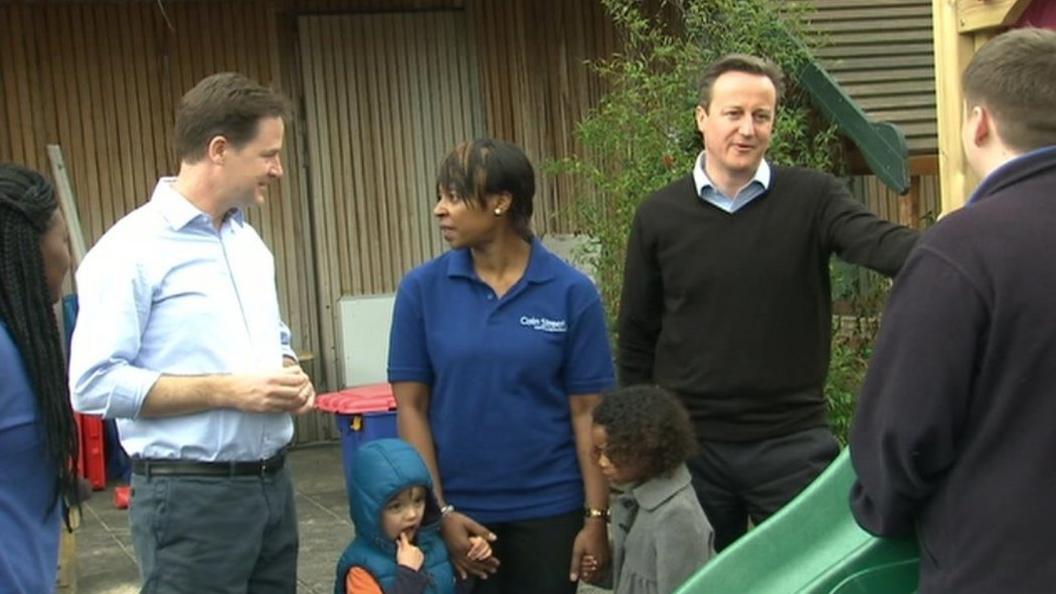David Cameron says policies must pass 'family test'
- Published
- comments
David Cameron: "Where you can help people come together and stay together then surely the government should play its part in helping"
All government policies will have to pass a "family test", David Cameron has announced.
He argued that parents and children were too often overlooked and could be left worse off by reforms.
He said online music videos could be given age ratings, and more money would be put towards relationship counselling services.
But Labour said he did not understand families' needs, as more households were now dependent on food banks.
From October, every new domestic policy "will be examined for its impact on the family", the prime minister said.
Mr Cameron told BBC Breakfast that no politician wanted to be "accused of being judgemental" over people's personal relationships, but added that government would "help people who come together stay together".
'Excessive bureaucracy'
In his speech he said: "I want every government department to be held to account for the impact of their policies on the family."
Mr Cameron also announced:
Online music videos could be given age ratings, with YouTube and the British Board taking part in a pilot project
The doubling of the budget for relationship counselling through Relate, to £19.5m
The expansion of a programme of assistance for so-called "problem families" who struggle with unemployment and debt
An increase in funding for councils who want to speed up adoptions
Mr Cameron said: "Whether it's the benefits system incentivising couples to live apart or penalising those who go out to work or whether it's excessive bureaucracy preventing loving couples from adopting children with no family at all.
"We can't go on having government taking decisions like this which ignore the impact on the family."
He said: "Put simply that means every single domestic policy that government comes up with will be examined for its impact on the family."

Analysis
By Sean Curran, political correspondent, BBC News

Families are important. And not just to you and me. They're one of the most important constituencies for politicians of all stripes.
That's why we hear so much about the virtues of "hard working families". And that's why you can expect to hear a lot about parents and children between now and the election.
Every party wants to be seen as the party of the family. But there are risks as well as benefits as the prime minister acknowledged when he said politicians often avoided talking about relationships because they did not want to appear judgmental.
The other, more obvious, danger is that opponents will suggest that many of your policies are not family friendly. Labour says David Cameron is out of touch and hasn't done enough to help households struggling to pay the bills.

The assessment will be carried out alongside other tests including for equality, cost-effectiveness and environmental impact.
Troubled families
BBC political correspondent Iain Watson said despite introducing policies on parental leave and to ease the burden of childcare costs, ministers recognised not enough voters saw the government as "family-friendly".
The Conservatives in particular were aware they needed to boost support among women, he said.
But, for Labour, shadow education secretary Tristram Hunt told the BBC News Channel: "It's all very well David Cameron saying he's in favour of the family, but his economic policies are undermining the viability of the family in Britain today."
Mr Cameron's speech comes as the government prepares to launch an extension of its programme to tackle troubled families, set up after the riots in London and other English cities in August 2011.
Up to 500,000 families are expected to be targeted - more than four times the number in the initial stage - with work due to begin first in the 50 local authorities where it has proved most successful.
The head of the programme, Louise Casey, said at the weekend that the families concerned were "off the barometer in the number of problems they have".
Health issues, both physical and mental, are expected to be at the forefront of the new push.
- Published18 August 2014

- Published18 March 2014

- Published4 April 2014

- Published15 August 2011
